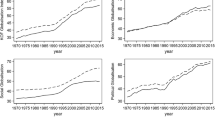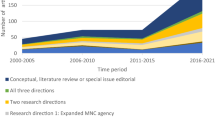Abstract
It is widely perceived that globalization squeezes public sector activities by making taxation more costly. This is attributed to increased factor mobility and to a more elastic labour demand due to improved scope for relocation of production, and thus employment across countries. We argue that this consensus view overlooks that gains from trade unambiguously work to lower the marginal costs of public funds. Moreover, we argue that a more elastic labour demand may actually reduce the marginal costs of labour income taxation and that globalization may actually reduce the labour demand elasticity.
Similar content being viewed by others
References
Andersen, T. M. (2003). Welfare policies, labour taxation and international integration. International Tax and Public Finance, 10, 43–62.
Andersen, T. M., & Skaksen, J. R. (2007). Labour demand, wage mark-ups and product market integration. Journal of Economics, 92, 103–138.
Andersen, T. M., & Sørensen, A. (2011, forthcoming). Globalization, tax distortions and public sector retrenchment. Scandinavian Journal of Economics.
Bernard, A. B., Eaton, J., Jensen, J. B., & Kortum, S. (2003). Plants and productivity in international trade. The American Economic Review, 93, 1268–1290.
Chen, H., Kondratowicz, M., & Yi, K.-M. (2005). Vertical specialization and three facts about U.S. international trade. The North American Journal of Economics and Finance, 16, 35–59.
Hijzen, A., & Swaim, P. (2008). Offshoring, labour market institutions and the elasticity of labour demand (GEP Research Paper 2008/05).
International Monetary Fund (2007). World economic outlook: spillovers and cycles in the global economy. Washington: International Monetary Fund. April, Chap. 5.
Kleinert, J. (2003). Growing trade in intermediate goods: outsourcing, global sourcing, or increasing importance of MNE networks? Review of International Economics, 11, 464–482.
Melitz, M. J. (2003). The impact of trade on intra-industry reallocations and aggregate industry productivity. Econometrica, 71, 1695–1725.
Molana, H., & Montagna, C. (2006). Aggregate scale economies, market integration, and optimal welfare state policy. Journal of International Economics, 69, 321–340.
Molana, H., & Montagna, C. (2007). Expansionary effects of the welfare state in a small open economy. North American Journal of Economics and Finance, 18, 231–246.
OECD (2007). OECD economic outlook. Paris: OECD.
Panagariya, A. (1999). Trade openness: consequences for the elasticity of demand for labor and wage outcomes (Mimeo). University of Maryland.
Razin, A., & Sadka, E. (2005). The decline of the welfare state—demography and globalization in cooperation with C.W. Nam. CESifo book series. Cambridge: MIT Press.
Rodrik, D. (1997). Has globalization gone too far? Washington: Institute for International Economics.
Senses, M. Z. (2006). The effects of outsourcing on the elasticity of labor demand (CES Discussion Paper No. 06-07).
Slaughter, M. J. (2001). International trade and labor-demand elasticities. Journal of International Economics, 54, 2756.
Swank, D. (2005). Globalisation, domestic politics, and welfare state retrenchment in capitalist democracies. Social Policy and Society, 4(2), 183–195.
Tanzi, V., & Schuknecht, L. (2000). Public spending in the 20th century—a global perspective. Cambridge: Cambridge University Press.
Turnovsky, S. J. (1988). Coordination of optimal taxation in a two-country general equilibrium model. Journal of International Economics.
van der Ploeg, R. (1987). Coordination of optimal taxation in a two-country equilibrium model. Economics Letters, 24, 279–285.
Author information
Authors and Affiliations
Corresponding author
Additional information
We thank three anonymous referees and John D. Wilson for helpful suggestions that have improved the paper significantly. Financial support from the Danish Research Council (FSE) and the Globalization Programme at Aarhus University is gratefully acknowledged.
Rights and permissions
About this article
Cite this article
Andersen, T.M., Sørensen, A. Globalisation squeezes the public sector—is it so obvious?. Int Tax Public Finance 18, 369–382 (2011). https://doi.org/10.1007/s10797-011-9166-z
Published:
Issue Date:
DOI: https://doi.org/10.1007/s10797-011-9166-z




